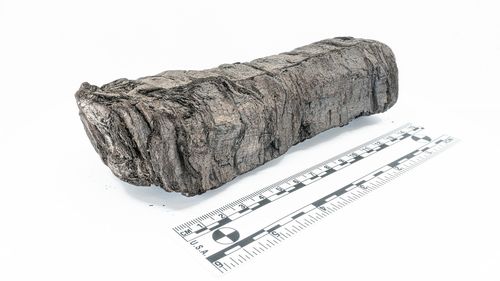Share this @internewscast.com
Scientists attempting to decode the contents of a charred, still-rolled scroll have identified both the author and the title of the manuscript nearly two millennia after it was entombed in the eruption of Mount Vesuvius.
The scroll â designated as PHerc. 172 â is among numerous others from the ancient Roman settlement of Herculaneum, submerged in volcanic material when Mount Vesuvius erupted in 79 CE. This discovery is part of the Vesuvius Challenge, an effort committed to interpreting the texts of the Herculaneum scrolls without the need to open them.
Encased under layers of mud and ash within a villa thought to have been owned by Julius Caesar’s father-in-law, the scrolls were unearthed by an Italian farmer during the 18th century.

Burned so badly they were carbonized, they are extremely fragile. Over the years, scholars have tried a range of methods to unroll them, including using weights, chemicals, gases, and pulverisation, though this often led to the scrolls being damaged or destroyed.
The Vesuvius Challenge was launched in 2023 to encourage researchers from around the world to try and decipher the scrolls by virtually unwrapping and decoding them.
Now, Marcel Roth and Micha Nowak, graduate students from Germany’s University of Würzburg, have uncovered the title and author of PHerc. 172.

Vesuvius Challenge researcher Sean Johnson made the same discovery around the same time, and both findings were independently reviewed by the competition’s papyrological team, according to a Tuesday press release from Oxford University’s Bodleian Libraries, where the scroll is housed.
The text deciphered identifies the scroll as “On Vices” by the Greek philosopher Philodemus, according to the Vesuvius Challenge. It is a part of Philodemus’ ethical treatise known in full as “On Vices and Their Opposite Virtues and In Whom They Are and About What,” and could even be the first book in the series, though this is not yet clear.
Oxford University’s Bodleian Libraries suggests that the book number could “plausibly” be read as an alpha, which would indicate that the scroll is book one in the series, but it could also be other numbers, such as a delta, which would mean it is book four.

Scholars have generally thought that the first book of “On Vices” was a text called “On Flattery,” but the content of PHerc. 172 does not correspond with this.
Philodemus, according to the Bodleian Libraries, was an Epicurean philosopher whose teachings “emphasise the pursuit of pleasure as central to a good life.” The majority of the scrolls found preserved in the Herculaneum villa were his works, Bodleian Libraries said.
Michael McOsker, a researcher in papyrology at University College London, who is also a member of the Vesuvius Challenge papyrology team, called the new discovery a “very exciting development.”

“Other books from the On Vices and their Opposite Virtues are known from the papyri that were physically unrolled â best known are On Property Management (book nine, presumably the opposite virtue to greed) and On Arrogance (book 10, presumably the opposite vice to having a correct evaluation of yourself), but there are others too,” McOsker said.
“This will be a great opportunity to learn more about Philodemus’ ethical views and to get a better view of the On Vices as a whole, especially if it turns out to be the first book.”
This find, the first time a scroll’s title has been read, is the latest from the Vesuvius Challenge.

Rural tradition sends music superstar to her lawyers
In October 2023, the first full word from one of the unopened ancient papyri was decoded with the help of computer technology and advanced artificial intelligence.
The word was “ÏοÏÏÏ Ïαϔ or “porphyras,” which is Greek for purple.
And in February, researchers investigating columns of text from PHerc. 172 identified the word “διαÏÏοÏή,” meaning “disgust,” which appears twice within a few columns of text, the Bodleian Libraries said.












